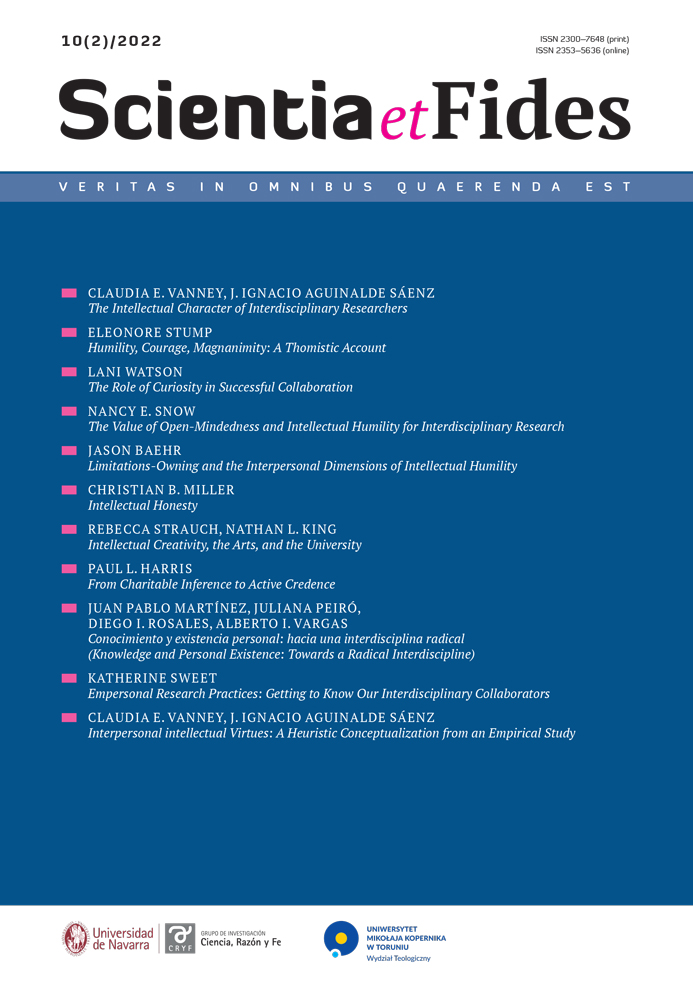Interpersonal Intellectual Virtues
A heuristic Conceptualization from an Empirical Study
DOI:
https://doi.org/10.12775/SetF.2022.025Keywords
virtue epistemology, intellectual virtues, interdisciplinary research, second-person perspective, interpersonal relationshipsAbstract
Due to the hyperspecialization so prevalent nowadays, interdisciplinary research is a demanding kind of epistemic activity. The concept of intellectual virtue as presented by responsibilist approaches of virtue epistemology could offer an effective counterweight to this challenge but raises the question of what epistemic virtues are necessary for interdisciplinarity.
Based on a qualitative study, we identify and heuristically conceptualize a relevant subset of epistemic virtues required by interdisciplinarity that we call interpersonal intellectual virtues. These virtues are personal character traits that facilitate the reciprocal acquisition and distribution of knowledge with and through other people. By their very nature, they are only exercised in an interpersonal relationship that seeks an epistemic good, so in some sense, they are at the intersection of social virtues and intellectual virtues.
We use Jason Baehr’s four-dimensional proposal for the essential components of intellectual virtues (motivational, affective, skill, and judgment) to show that these interpersonal traits are indeed epistemic virtues. Some examples of interpersonal intellectual virtues are intellectual empathy, intellectual respect, and intellectual trust, among others. Intellectual empathy is a paradigmatic case that we analyze in more detail.
Finally, we suggest that interpersonal intellectual virtues are the key character traits of people involved in any successful collective epistemic endeavor, interdisciplinary research being a privileged context in which we can clearly see their manifestation.
References
Aikin, Scott F., and J. Caleb Clanton. 2010. "Developing Group‐Deliberative Virtues." Journal of Applied Philosophy 27 (4):409-424.
Baehr, Jason. 2011. The inquiring mind. On intellectual virtues and virtue epistemology. Oxford: Oxford University Press.
Baehr, Jason. 2013. "The Structure of Open-Mindedness." Canadian journal of philosophy 41 (2):191-213.
Baehr, Jason. 2016. "The four dimensions of an intellectual virtue." In Moral and Intellectual Virtues in Western and Chinese Philosophy. The Turn Toward Virtue edited by Mi Chienkuo, Michael Slote and Ernest Sosa, 86-98. New York: Routledge.
Baehr, Jason. 2021. Deep in Thought. A Practical Guide to Teaching for Intellectual Virtues. Cambridge, MA: Harvard Education Press.
Battaly, Heather. 2006. "Teaching Intellectual Virtues : Applying Virtue Epistemology in the Classroom." Teaching Philosophy 29 (3):191-222.
Battaly, Heather. 2011. "Is empathy a virtue?" In Empathy. Philosophical and Psychological Perspectives, edited by Amy Coplan and Peter Goldie, 277-301. Oxford: Oxford University Press.
BonJour, Laurence. 1985. The structure of empirical knowledg. Cambridge (MA): Harvard University Press.
Chisholm, Roderick M. 1989. Theory of Knowledge. 3rd ed. New Jersey: Prentice-Hall International.
Coplan, Amy, and Peter Goldie, eds. 2011. Empathy. Philosophical and Psychological Perspectives. Oxford: Oxford University Press.
Driver, Julia. 2003. "The Conflation of Moral and Epistemic Virtue." Metaphilosophy 34 (3):367-383.
Fricker, Miranda. 2009. "Can there be institutional virtues?" In Oxford Reading in Epistemology (Special theme: Social epistemology), edited by Tamar Szabó Gendler and John Hawthorne. Oxford: Oxford University Press.
Frith, C. D., and U. Frith. 2006. "The neural basis of mentalizing." Neuron 50 (4):531-4.
Kawall, Jason. 2002. "Other–Regarding Epistemic Virtues." Ratio 15 (3):257-275.
King, Nathan L. 2021. The excellent mind. Intellectual virtues for everyday life. New York: Oxford University Press. Book.
Lahroodi, Reza. 2019. "Virtue Epistemology and Collective Epistemology." In The Routledge handbook of virtue epistemology, edited by Heather Battaly, 407-419. London: Routledge.
López, M., V. Arán, and M. C. Richaud de Minzi. 2014. "Empatía: Algunos debates en torno al concepto." Avances de Psicología Latinoamericana 32:37-51.
Millgram, Elijah. 2015. The great endarkenment. Philosophy for an age of hyperspecialization. New York: Oxford University Press.
Polo, Leonardo. 1987. Curso de Teoría del Conocimiento. Tomo I. 3 ed. Pamplona: Eunsa. Original edition, 1988.
Roberts, Robert C., and W. Jay Wood. 2007. Intellectual Virtues. An Essay in Regulative Epistemology. Oxford: Clarendon Press.
Vanney, Claudia E., and Ignacio Aguinalde. 2021. "Second-person perspective in interdisciplinary research: A cognitive approach for understanding and improving the dynamics of collaborative research teams." Scientia et Fides 9 (2):155-178.
Wright, Sarah. 2014. "The stoic epistemic virtues of groups." In Essays in collective epistemology, edited by Jennifer Lackey, 122-141. Oxford: Oxford University Press.
Zagzebski, Linda Trinkaus. 1996. Virtues of the mind. An inquiry into the nature of virtue and the ethical foundations of knowledge. Cambridge: Cambridge University Press.
Downloads
Published
How to Cite
Issue
Section
License
Copyright (c) 2022 Claudia Vanney, J. Ignacio Aguinalde Sáenz

This work is licensed under a Creative Commons Attribution-NoDerivatives 4.0 International License.
CC BY ND 4.0. The Creator/Contributor is the Licensor, who grants the Licensee a non-exclusive license to use the Work on the fields indicated in the License Agreement.
- The Licensor grants the Licensee a non-exclusive license to use the Work/related rights item specified in § 1 within the following fields: a) recording of Work/related rights item; b) reproduction (multiplication) of Work/related rights item in print and digital technology (e-book, audiobook); c) placing the copies of the multiplied Work/related rights item on the market; d) entering the Work/related rights item to computer memory; e) distribution of the work in electronic version in the open access form on the basis of Creative Commons license (CC BY-ND 3.0) via the digital platform of the Nicolaus Copernicus University Press and file repository of the Nicolaus Copernicus University.
- Usage of the recorded Work by the Licensee within the above fields is not restricted by time, numbers or territory.
- The Licensor grants the license for the Work/related rights item to the Licensee free of charge and for an unspecified period of time.
FULL TEXT License Agreement
Stats
Number of views and downloads: 1010
Number of citations: 0



